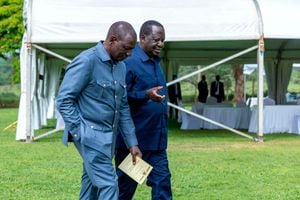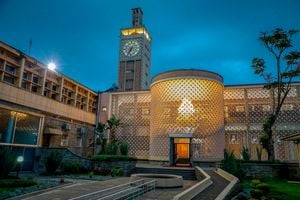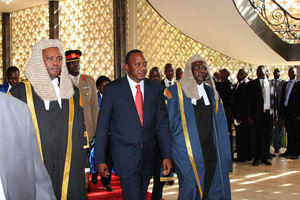
The National Assembly during a sitting.
The unprecedented demonstrations by Generation Z that led to the invasion of Parliament on June 25 not only altered how lawmakers engage with the people but also provided an opportunity for President William Ruto to test his strength in the two Houses.
Ranging from vetting Cabinet secretaries twice, rejection of the Finance Bill, 2024, forcing Parliament to go back to the drawing board and undertaking the first impeachment of a deputy president under the 2010 Constitution, the 13th Parliament was called into action by the President.
Political pundits point out that all through these challenges, Dr Ruto easily got his way, cementing his control of Parliament but bringing to the fore the question of the independence of the August House.
Lawmakers vetted CSs twice, with the second time coming after the Gen Z-led protests which forced the President to sack his Cabinet and reconstitute it afresh.
Moi University don Masibo Lumala said 2024 has been a tricky year for Parliament. He said the President threw the lawmakers under the bus when he declined to sign the Finance Bill, 2024, despite having earlier mobilised them to support it.
State House
“The MPs were called to State House and told to support the Bill, then later when Gen Zs caused a problem, the same President bowed to pressure and declined to sign it. This placed MPs in a difficult situation and also raised the question on separation of powers,” Prof Lumala said.
On the impeachment of Mr Gachagua, he said that was another test of the independence of Parliament. The don added that everything looked pre-determined from the onset.
“By all means, the impeachment of the deputy president was pre-determined, both the speaker and his deputy made remarks that, ‘he must go’. It showed that the President exerted his pressure on Parliament,” Prof Lumala said.
“The question is, will 2025 be different? Will we see a robust discussion on issues affecting Kenyans? He asked.
Political analyst Javas Bigambo said the President only tested Article 150 of the Constitution by railroading the impeachment of DP Gachagua.
“The President did not test the mettle of Parliament, he actually threw MPs into shame. He only tested Article 150 of the Constitution which has never been tested before,” Mr Bigambo said.
In addition, he said the cancellation of Public Private Partnership between the government and Indian firm, Adani, which had been endorsed by MPs, exposed them to shame.
“It is the same MPs who endorsed the Finance Bill, 2024, despite rejection by the people. They also endorsed the Adani deal, but again, Ruto cancelled it and they were all clapping… so Ruto actually exposed Parliament,” Mr Bigambo said.
He said that the real winners were the people who exercised their power directly and won.
“It’s the people who tested their sovereignty and democracy, they rejected the Finance Bill which the President didn’t sign. The people also pushed the President to dissolve his entire Cabinet and co-opted members of the opposition into his government,” Mr Bigambo said.
Kitui Central MP Makali Mulu said it has been a challenging year for MPs, adding that a lot needs to be done to change the image in the New Year.
Dr Mulu said what the President did to Parliament this year exposed the House as ineffective in executing its function.
“He (Ruto) rejected the Finance Bill after MPs supported it, and he cancelled Adani deal after MPs defended it as being good. The House has a lot to do to redeem itself because out there, we are done,” Dr Mulu said.
Ouster motion
Indeed the impeachment of Mr Gachagua also placed MPs in a precarious position as there were claims of bribery for them to endorse the ouster motion. However, a majority of lawmakers denied the bribery claims, saying that they exercised their independent minds during the consideration of the motion.
When the motion was introduced in the House by Kibwezi West MP Mwengi Mutuse, the Speaker of the National Assembly Moses Wetang'ula described the impeachment process as a significant constitutional moment.
“This motion presents an unprecedented test of the provisions for removing a Deputy President under the 2010 Constitution,” Mr Wetang’ula said.
The Speaker termed the impeachment motion as a pivotal moment in Kenya’s political landscape, a momentous time for the House since it is the first under the 2010 Constitution to be considered by the House.
He drew parallels to a similar moment in the 6th Parliament when, in April 1989, former Embakasi MP David Mwenje successfully moved a vote of no confidence against then-Vice President Josphat Karanja.
Under the current Constitution, the process of removing a DP has shifted to Parliament, unlike during the previous regime where the president had the power to dismiss the vice-president.
Following sustained protests by Gen Zs, President Ruto rejected the Finance Bill, 2024, putting Parliament in an awkward position. The lawmakers were left to reorganise the budget as the Sh346 billion projected revenue that was to be collected in the proposals could not be realised.
Parliament returned to the drawing board to consider the rejected Bill clause by clause. The rejection of the Bill resulted in a reduction of government allocations to counties and ministries’ departments and agencies that now operate on a lean budget.










